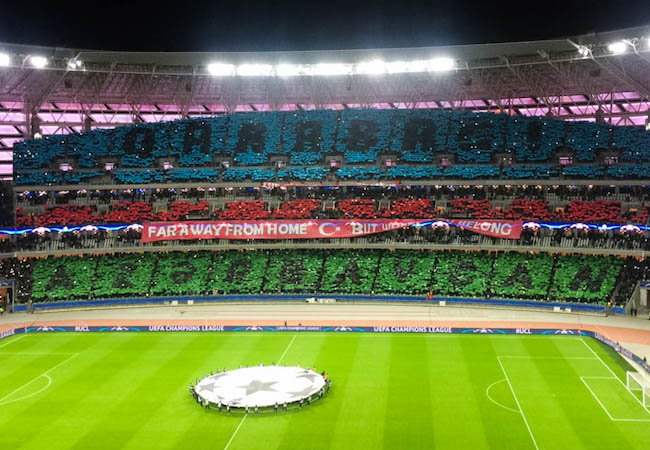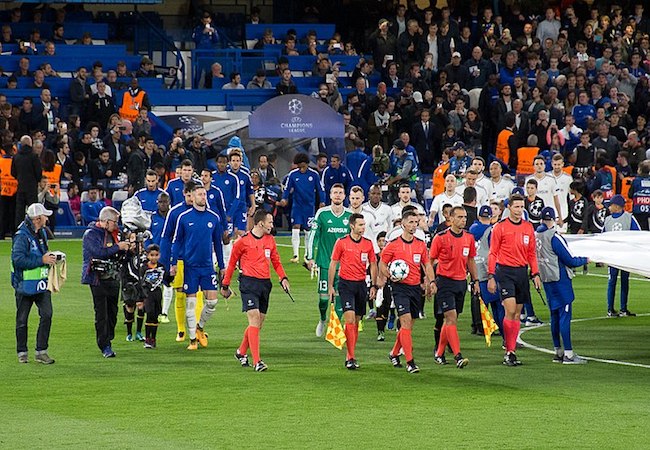Azerbaijani soccer club gives hope to battered region

By Elin Suleymanov
A scrappy soccer team from a tough part of the world just finished a gallant run in the UEFA Champions League soccer tournament currently underway in Europe. The Cinderella story of Qarabag FK, from Azerbaijan, did not end with a glass slipper, but the hope it provided to its home country was very real.
Though Qarabag was eliminated from the tourney with a loss to Roma, one of the top dogs in Italian soccer, Qarabag’s impact on the Champions League tournament has been massive. Qarabag’s two draws against Atletico Madrid sent shockwaves through the soccer community. By drawing Atletico Madrid, one of the favorites to win, Qarabag effectively eliminated the Madrid side from the tournament.
Qarabag also played close games against Roma that were competitive until the last whistle, and they also put on a valiant display against Chelsea, the British powerhouse. For clubs like Qarabag — whose budget is tens of times smaller than Europe’s elite teams — the Champions League is a platform that can be used to showcase a team, league or even a country. Qarabag’s performance has rightly placed Azerbaijani soccer on the map.
Qarabag’s backstory is even more compelling than its gritty performance in the UEFA Champions League. Originally from the town of Agdam along Azerbaijan’s Nagorno-Karabakh region, Qarabag has not played a home game in 24 years. If anyone tries to visit Qarabag’s stadium, the only welcome he would receive would be from Armenian snipers; Armenia illegally seized the Nagorno-Karabakh region more than two decades ago. All that remains of Qarabag’s stadium is rubble and weeds – sad reminders of brutal ethnic cleansing.
In 1988, Armenia laid territorial claims against Azerbaijan. The ensuing unrest escalated into a full-scale war between Azerbaijan and Armenia with Agdam at the center of the fighting. Armenian bombs hit Qarabag’s stadium as well as the club’s training grounds. Luckily, at the time of the attacks, no players or other personnel were present. But Qarabag and the town of Agdam began to crumble. In July 1993, with scores of civilians killed and expelled, Agdam fell. The Armenian military has occupied the region ever since and has prevented civilians from returning home.
The war between Azerbaijan and Armenia has left an indelible mark on the nation of Azerbaijan and on Qarabag. Former player and coach Allahverdi Bagirov became a national hero during his time with the club. He saved many people during the Khojali Massacre, during which hundreds of people were killed in 1992 by Armenian troops and remnants of the Soviet military units. Bagirov lost his life to an anti-tank mine in June of that year.
For 24 years, Armenia has illegally occupied 20 percent of sovereign Azerbaijani territory. Despite the wide recognition of Nagorno-Karabakh’s legal status as Azerbaijan, Armenia has refused to implement four separate resolutions by the United Nations Security Council that demand immediate withdrawal from the occupied territories of Azerbaijan.
Qarabag has become a symbol of survival and a beacon of hope for Azerbaijan. The story of Qarabag began in 1951. As founding members of the Azerbaijan Premier League, the club won the league championship in its second season. It has also had success at smaller scale international tournaments. The club ventured into the early stages of the Europa League, the Intertoto Cup and the Cup Winner’s Cup several times, but its current run in the Champions League is special.

The Champions League represents the pinnacle of European soccer competition. To arrive at this level of competition, Qarabag had to demonstrate its prowess in series of qualification matches against other clubs that had been crowned champions of their domestic leagues.
Valued at just $15 million, Qarabag is known as a David among Goliaths. By way of comparison, Real Madrid is valued at $744 million. Qarabag’s historic run could not have been imagined not long ago.
Qarabag spiraled into financial ruin during the 1990s. By 2001 the club’s continued operation was in question, but sponsorship by Azersun Holding, a leading food producer and retailer, breathed new life into the club. Qarabag plays its games in Baku, the capital of Azerbaijan, at the Azersun Arena and Tofiq Bahramov Stadium. The club busses supporters from refugee settlements so the former residents of Agdam can watch their hometown team play.
Qarabag’s head of communications, Nurlan Ibrahimov, explains: “This club means everything to the people of Azerbaijan. Our lands are being occupied. It’s through success with Qarabag that we bring that to the attention of the world.”
When Qarabag beat FC Copenhagen in a playoff qualifier to gain entry into the UEFA Champions League, it was a moment of complete elation for Azerbaijani soccer fans. There is no better symbol of hope and pride in sports than a refugee club ascending to such heights.
Qarabaq brings heart to the game and, regardless of its results on the field, the club inspires millions. The team’s message is simple but powerful: war may ravage homes, but it cannot kill the human spirit; it cannot stop the beating heart of Azerbaijan’s Qarabag.
Elin Suleymanov is Azerbaijan’s ambassador to the U.S.




